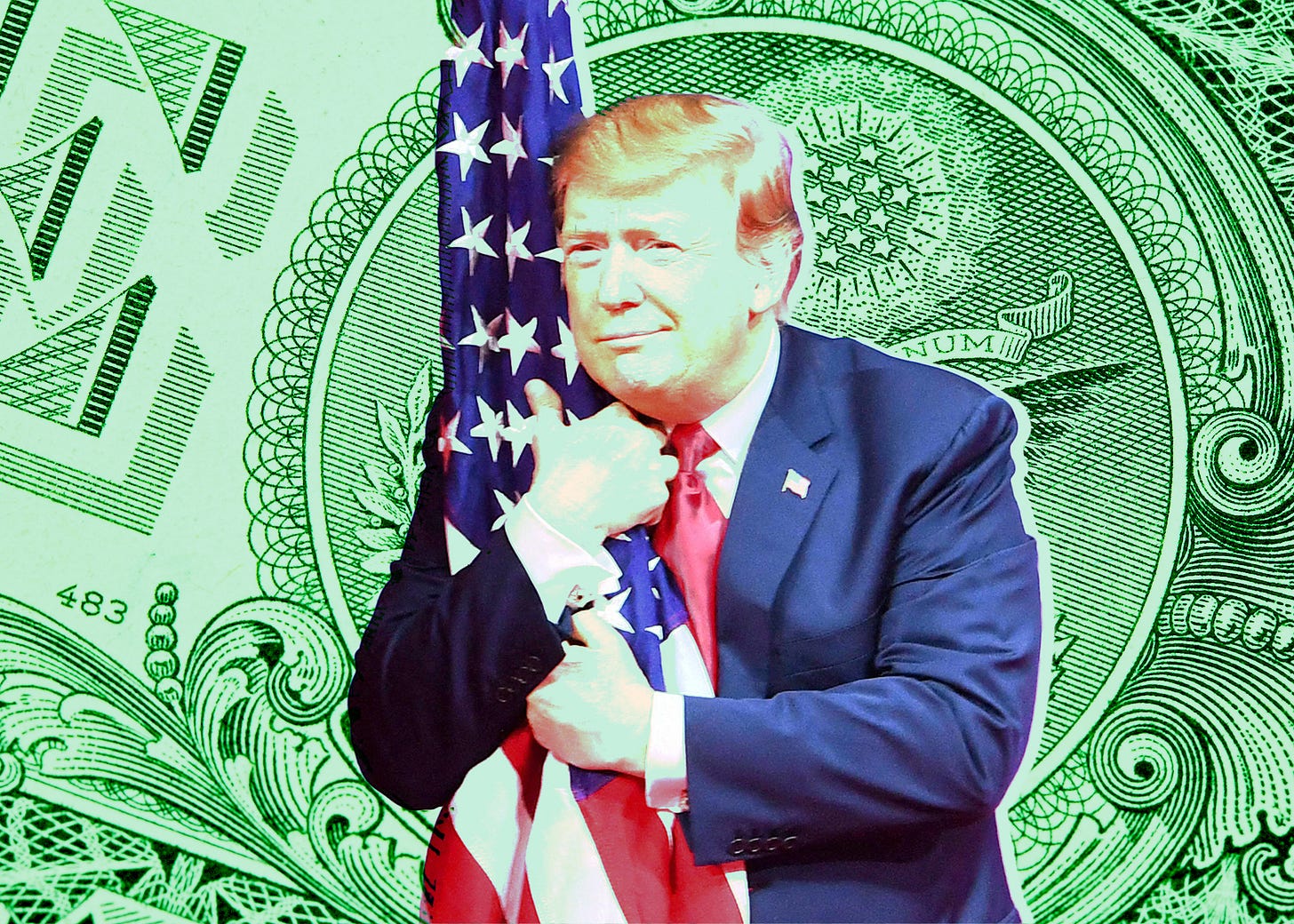The Patriotic Rich
Not all of them are like Trump, willing to see the poor get poorer so the rich can get richer.
DONALD TRUMP HAS HUGGED A FLAG more than once, and he’s now adding flagpoles on the north and south White House lawns. He addressed uniformed troops at Fort Bragg (at least the fit ones who love him and don’t look fat) and he’s ordered up a $45 million military parade on June 14 that could wreck D.C. streets to the tune of $16 million.
He probably thinks of himself as a patriotic billionaire.
Imagine, if you would, a different kind of wealthy role model for our nation’s youth—and its grownups, too, for that matter. A millionaire or billionaire who does not waste taxpayer money, destroy government services, attack science, undermine public health, pave the Rose Garden, and decorate the Oval Office with so much gilt that you halfway expect Marie Antoinette to show up anytime.
How about a millionaire or billionaire who obeys the law and isn’t constantly, voraciously on the hunt for more power and more money? Who would prefer a more equitable society and would pay more taxes to make it so?
These people do exist. Some are philanthropists. Some put money into political activism. And some create policy advocacy groups, like the nonpartisan Patriotic Millionaires. The group’s members are self-described “proud traitors to their class,” offering a platform of foundational economic changes to coincide with the nation’s 250th birthday next year: AMERICA 250: The Money Agenda.
“Over the long term, the unfair tax system is a cause of the oligarchy being able to do what it does. The proposals that even the progressives are making are not sufficient to actually change the course of history,” Patriotic Millionaires Chair Morris Pearl, former managing director at BlackRock, told me in an interview.
The group’s four-part proposal, released in April, aims to do just that. It starts with exempting people below a certain income from federal taxes and making up the revenue by imposing a 3 percent surtax on income above $1 million, rising to 8 percent above $10 million. Other elements include raising the minimum wage to the cost of living for a single adult, and indexing it; equalizing the tax rate for capital gains and ordinary income over $1 million; and significantly taxing the intergenerational transfer of wealth.
Forget false modesty. “The solutions to the problem are not complicated, and the Patriotic Millionaires have them all,” the group says on its home page. Their plan, they say, would “ensure prosperity and stability for America’s next 250 years.”
Although the Patriotic Millionaires’ agenda is forward-looking, in the immediate moment their focus is on the depredations of the Republican budget bill that would simultaneously explode the national debt, damage the safety net, and exacerbate inequality. The nonpartisan Congressional Budget Office reported this week that the House GOP bill would reduce annual household resources by roughly $1,600 for the lowest-income 10 percent, and increase them by about $12,000 for the top 10 percent.
Americans really don’t like this budget plan. Registered voters opposed it 53 percent to 27 percent in a new Quinnipiac poll, and a full 87 percent said federal funding for Medicaid—which the bill cuts bigly—should either increase or stay the same.
The backdrop to the legislative activity and public opinion is a massive and persistent wealth gap. The top 10 percent of households by wealth held over two-thirds of the nation’s wealth in the third quarter of 2024, the Federal Reserve said in a March report, while the bottom 50 percent held just 2.4 percent.
ANYONE CAN CLAIM to be a patriot. Trump praised the January 6th Capitol insurrectionists as patriots and even paid out $5 million in taxpayer dollars to the family of Ashli Babbitt, who was fatally shot trying to climb through a broken window into an area where lawmakers, staff, and journalists were trying to escape the House chamber and “patriots” were beating up police to reach them.
These millionaires have a different definition of patriotism that tracks more with the common good, or, as the Constitution put it, the general welfare. “It’s not that I’m altruistic. I want my children and grandchildren to grow up in the kind of country where I grew up,” Pearl says. “I’m trying to get what I want.”
Elon Musk, who spent $277 million last year helping elect Trump and Republicans, is trying to do the same, Pearl says. He adds: “I’m hoping that I’ll be more successful in the long run.”
People like Pearl will never convince Trump that he’s a bad role model, or an unpatriotic billionaire. This is after all the president who portrayed himself as a king on social media. When he went to see Les Misérables on opening night at the Kennedy Center—the institution he now leads after executing an unprecedented takeover—he evinced no sense of awareness of what the musical is about. “I love the songs, I love the play,” he told Fox News Digital. He loves “Do You Hear the People Sing?,” the show’s anthem sung by oppressed people rising up against their despot-king. (“I hereby retire from satire,” Andy Borowitz wrote on Facebook.)
For all we know, Trump may interpret the show as a sympathetic story about downtrodden MAGA and white South African peoples straining for freedom from a tyrannical leader, like, maybe, the last guy in the White House.
Best case, in this case, is that the politics didn’t break through. But he loved the songs.




